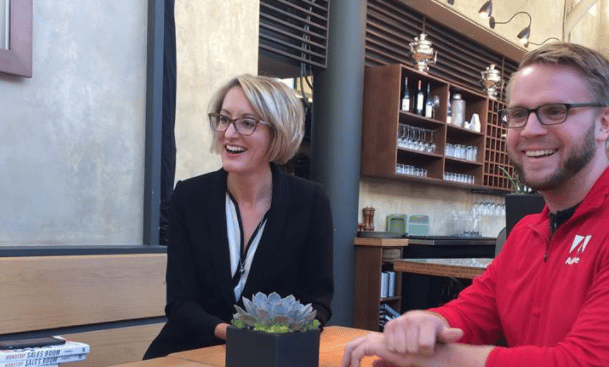It has often been said that among the many musical talents of renowned jazz trumpeter Dizzy Gillespie was his skill for blending harmony with the unexpected. He himself summed it up best by saying: “It’s taken me all my life to learn what not to play.” Dizzy knew it was never enough to just give an audience what they thought they wanted. He recognized, as is the case with most professionals, that there needs to a discipline to what you do. People tend to be motivated and moved best when you take the lead, with the occasional surprise thrown in for good measure.
This is a way of thinking that’s not just limited to jazz musicianship. There’s a lot of insight in there that applies just as much to sales. After all, both involve connecting with people and only those who hone a mastery of their craft are truly successful.
Whether you are a business owner or part of a sales team for a medium or large-sized company, your performance as a salesperson is determined by how often you successfully close sales—sealing the deal that translates goods or services into revenue. To close more business effectively, you must be the one who is controlling and directing the customer through each step of a sales process. Don’t expect the customer to know what to do next. Most people are commitment-phobic. They’re not going to make a decision until they are presented with options.
Have you ever faced a situation where you follow up with a customer after several months, only to be told that they have just finished negotiations with different vendor? It’s frustrating and yet it’s entirely preventable. By waiting so long to follow up, you may have been doing what you assumed the customer wanted. However, this does nothing to help position you where you need to be for when that customer is ready to buy.
Stay in control of your sales process by adopting a strategy that gets your customers to commit to a series of steps—and to stick to it. In my sales coaching sessions, my advice is that you need to be following up with each of your customers at a minimum of every 30 days in some way. It doesn’t necessarily have to be by phone, but you need to be doing something to stay in that top-of-mind position.
Plan and backup
Before you engage any customer in a conversation, you need to have plan on how you’re going to close more business with that person. You also need to back a backup plan. For example, if you can’t meet your primary objective—to get a commitment to meet with a decision maker in your client’s firm, for instance—-your backup can be to get the name and contact information of that decision-maker.
Know what’s next
If your best efforts don’t result in closing a deal with a customer, you need to decide what is going to happen next. It’s not enough to simply agree to talk again later. When will you talk again? Be specific. Your goal needs to include setting a date, and a well-defined set of next steps.
Those who have attended one of our Engage Sales Mastery Workshops have seen me map out a series of possible next steps in great detail. In this article, however, let me give you a glimpse of what we cover. When attempting to close a sale, your customer can choose to say “Yes,” “No” or “Maybe.” If they say “No,” find out why. Is it because there are no projects going on? Is it because they have chosen another supplier? It is simply the wrong time for a new project? The answers you receive to those questions will give you something to build on for your follow-up strategy.
Apply the same approach when the answer is “Maybe.” If, for example, a customer says: “We are not doing anything until the end of the fourth quarter of this year, call me back in December,” you would respond by asking some probing questions. “I’d be happy to call you in December…is that when you expect to have your project ready to go, or will that just be when you’re ready to start investigating a possible start to the project?” Similarly, if the customer says: “what you’re proposing sound like a great idea, but we really just don’t have the budget yet,” you can respond by asking: “when is your budgeting process starting?” The answers you obtain give you added insight on formulating your next steps with each customer.
Use the right tools to help keep you on track
Keeping track of every conversation and every commitment you make to pursue next steps in sales…these are not the kinds of things you can simply commit to memory. This is why a customer relationship management database (or CRM) is absolutely vital. It could be as simple as a PC-based ACT! database, as intuitive as Daylite for Mac, or as substantial as a Salesforce.com account. No matter which one best suits your needs, a CRM is a wise investment. It’s far from being an administrative nuisance. Think of it as an extension of your brain. It remembers all the commitments you make and the people you talk to, and it doesn’t get sidetracked the way all of us do in our day-to-day lives. Deals get lost too easily by simply forgetting to make a note to follow-up with a prospect. Don’t take that risk! Rely on your CRM instead.
Give your customer the opportunity to do the closing
Do the unexpected! One of my favorite ways of doing this is by asking the following question: “What do you want to do next?” It’s a great closing question because it will tell you right away whether or not your customer is ready to move forward. In cases where a customer has a complicated buying process, you can ask: “Who else needs to review the presentation documentation or proposal?”
It is a very disarming question. By giving your customer the opportunity to do the closing on a sale, you give them the feeling that they are in control of the conversation (even though you are doing so while still being very much in control of the sales process). When used properly, it is a powerful question that helps you move a conversation forward and close more business in less time.
Much like Dizzy Gillespie in full flight on his trumpet, your job is to keep things moving in a conversation—to win over your audience, to help them know what’s going to come next in the process, and to leverage the power of the unexpected. By creating and nurturing great dialogue, people will want to talk to you more often, you’ll close more business more often, and you’ll have the dynamite sales records as proof.
Dedicated to increasing your sales,



